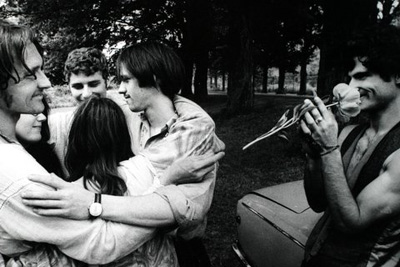 Not so long ago, I picked up a copy of Philip Gura's new book on Transcendentalism — that brief flowering of the New England mind — and it started me thinking again about that most American tension, how self and society articulate. As a nation, we have long valorized the strong minded individual who lives by his (usually his) own rules or takes up arms in pursuit of his vision of right. For so much of American history, the individual has reigned supreme, and phrases like "Emersonian individualism" roll off of Transcendental tongues with ease, describing a mood or motivation as much as an idea.
Not so long ago, I picked up a copy of Philip Gura's new book on Transcendentalism — that brief flowering of the New England mind — and it started me thinking again about that most American tension, how self and society articulate. As a nation, we have long valorized the strong minded individual who lives by his (usually his) own rules or takes up arms in pursuit of his vision of right. For so much of American history, the individual has reigned supreme, and phrases like "Emersonian individualism" roll off of Transcendental tongues with ease, describing a mood or motivation as much as an idea.
From Ralph Waldo to Ayn Rand, there seems to be something uniquely persistent in American culture that privileges the individual over the collective, even as our stark individualism breeds a nostalgic desire for the community lost, the community our individuals precludes. Call it High Noon syndrome or garycooperitis, but left and right, Americans adore the hero whose commitment to an individual vision makes compromise and coexistence with others impossible. For Emerson, as Gura writes, “the supremacy of the individual consciousness” could produce a "profound sense of universal brotherhood," because in his estimation, we all share a common, divinely implanted moral compass. Since Emerson's time, however, that moral compass has become a mere phantom of itself, invisible to all but the seers among us, and our nation has come to approximate so many million atoms in Brownian motion.
When planning this year's Colloquium on Social Change (put on annually by the Department of Special Collections at the UMass Amherst library), individualism was not on the agenda, but the spectre of individualism has haunted me nevertheless. At first glance, our speakers on Oct. 29 (7 p.m. in the Cape Cod Lounge, UMass Amherst Student Union) would not seem to be addressing the topic even remotely, and I suspect they would not see themselves in that light either. Todd Gitlin and Raymond Mungo are both veterans of the political and countercultural movements of the late 1960s, and as writers and thinkers they have touched on a range of subjects relating to the media, society, and politics. In my own feverish mind, however, in their lives and writing, I see them both as addressing the question of how the individual conscience and collective good can coexist.
Mungo first rose to public notice as one of the founders of the Liberation News Service (LNS) during that hot summer of 1967. He and his colleague Marshall Bloom created a news service that, from their vantage point would tell it like it is — or tell it like the main stream press would not — and for several years, the LNS issued twice-weekly packets of news items that were picked up mostly by the underground and collegiate press. In a way, their actions are in keeping with the long tradition of individualism: if my views and my perspective are not being heard in the media, let me make them heard. The LNS grabbed the reins of the media and attempted to turn it to their ends. Yet what I find interesting is that famously (or to use Mungo's term, Famous Long Ago), Mungo and Bloom split with the New York faction of the LNS and established a competing branch on a commune in rural western Massachusetts. If there was ever an act that flies in the face of the individualist ethos, it must be establishing a commune, and I read this move as more than a then-fashionable shift to the backwoods. Mungo has since lived the arc of a beautiful life, writing and lecturing, living and working as a social worker in Los Angeles, all acts that seem geared toward a vision of the common good.
 In most ways, the former political radical Gitlin has traveled a different path, but there are commonalities. Now a Professor of Sociology at Columbia University, he has written extensively on the subjects of political pragmatism and coalition building, but also the "ideals of sacrifice" and self-criticism: topics all of which strike me as subversive to the hyper-individualism we see daily. Like Emerson, perhaps, but unlike so many others since, the individual moral compass has guided Mungo and Gitlin to the ideals that demand true social commitment.
In most ways, the former political radical Gitlin has traveled a different path, but there are commonalities. Now a Professor of Sociology at Columbia University, he has written extensively on the subjects of political pragmatism and coalition building, but also the "ideals of sacrifice" and self-criticism: topics all of which strike me as subversive to the hyper-individualism we see daily. Like Emerson, perhaps, but unlike so many others since, the individual moral compass has guided Mungo and Gitlin to the ideals that demand true social commitment.
The pursuit of self has become so thoroughly ingrained in American culture that any effort to articulate a vision in which we claim responsibility for one another may seems ludicrous, unnatural, unrealistic, or downright dangerous. What I hope to see on Thursday when our speakers speak, however, is a brief moment where we can begin to talk about those dangers, as Mungo and Gitlin have done, about the ghosts of Emerson and our lives ahead.

